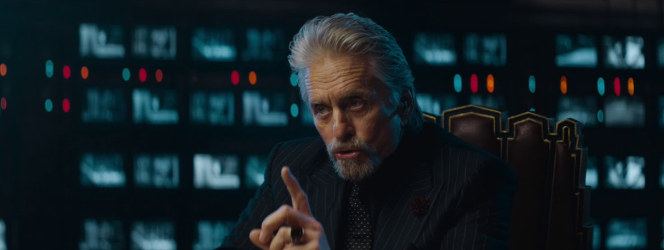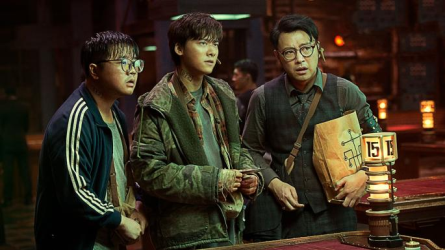The Boy and I have for years relied on our local independent theater for movie options when Hollywood has failed us, which was usual enough that said theater was our version of “Cheers” (and we were “Norm”s). And because the theater was Encino, we saw a lot of Israeli films amongst the more traditional European fare, and with a smattering of Persian mixed in. But a couple of years ago, we started venturing into Korean films, which were great, and this year we found a spot for Chinese imports. At the time of this writing, the worldwide top ten features the martial-action (Yemen Civil War based!) Operation Red Sea and the hilarious Detective Chinatown 2, each with around $550M, of which about $1.5-2M came from America (which bears on the subject film of this post, as we’ll see).
Chinese films are wild. They’re basically the descendants of the chopsockey flicks of the ’70s, and you can still see The Shaw Brothers label on a lot of these films. But what has happened, I’m told, is that the Chicoms have some grasp on the power of cinema, and have been pouring tons of cash into their film industry. The Chinese have the sort of political correctness that results in death when violated, and yet ironically—perhaps because their restrictions are not ours, perhaps also because film makers are given wide latitude—their movies feel a lot freer than ours. (Straight up no permutation of the gloriously racist Detective Chinatown 2 could be made in this country.) And they tend to be highly moral.
And this brings us to Animal World, a delirious adventure into the no-holds barred world of underground Rock Scissors Paper, which ended Jurassic World‘s reign at the Chinese box office.
At the time of this writing, the worldwide top ten features the martial-action (Yemen Civil War based!) Operation Red Sea and the hilarious Detective Chinatown 2, each with around $550M, of which about $1.5-2M came from America (which bears on the subject film of this post, as we’ll see). While not on that same level of success, Animal World is a delirious adventure into the no-holds-barred world of underground “Rock Scissors Paper”—and it did knock Jurassic World‘s off the #1 spot at the Chinese box office.
A commenter at Ace of Spades HQ, where this was originally posted, pointed out that the Chinese government could just be buying the tickets.
Our story begins with Kaisi, a loser whose job is to dress as a clown so unfortunate children can have their pictures taken with him. Kaisi has a nurse girlfriend he can’t marry (because he has no money), and while this bothers him, he’s basically too preoccupied with fantasies of mass murder to do anything about it. The opening scenes of this movie (after a teaser showing the climactic scene) are peppered with shots of him in a subway car, in full clown makeup, John-Wicking the hell out of monster-people.

Insane Posse-less Clown
Other reviews of this movie I’ve read refer to these sequences as “fun” and “highlights”, but since they’re so context-less at first, I found them alienating. Movies that try to get their impetus from the audience having to guess “Is that real? Did that really happen?” sit poorly with me. Fortunately, Animal World leaves the fantasy world behind pretty fast for a possibly more bizarre reality. (The fantasy sequences return at the end, but re-contextualized in a way that was meaningful.)
The story gets moving when, against his better judgment, Kaisi puts his mom’s apartment as collateral for a loan to help his friend out. His mom is comatose in the hospital, and he can barely keep her from being moved out into the hall (socialized medicine FTW). Well, what do you know but that those papers he signed (but didn’t read) actually put him on the hook for his pal’s debt. It will take him his whole life to pay them off.
And this is when Michael Douglas (!) shows up, as Anderson, and offers our hero an out. If Kaisi goes on a secret boat trip with a bunch of fellow losers, he’ll have the chance to not only wipe out his debt, but actually come away rich.

Pictured: Catherine Zeta-Jones’ husband.
After a final, surprisingly long fantasy where Kaisi imagines himself breaking free of his captors—and when I say long, I mean there’s gun play and an elaborate car chase and yet, at this point, we’re well aware that it can’t possibly be real because our hero doesn’t actually do things—he finds himself on the boat named “Destiny” where he must play Rock Scissors Paper to survive.
The rules are simple:
- Everyone starts with 4 cards each of Rock, Scissors and Paper, and three coins.
- Each game consumes one card from each player. If it’s not a draw, the winner takes a coin from the loser.
- To get off the boat alive, you must have three coins, and no cards left.
- Coins can be used to buy cards and are worth money (to survivors).
- There are no other rules, except no fighting. (What kind of chop-sockey is this?)
A quick murder from Anderson of a player who tries to flush his cards down the toilet, and constant rumors about bizarre experiments in the ship’s “lower hold”, combined with the fact that a certain number of (often highly scarred) people are repeat customers quickly convinces us of the seriousness of the situation.
Kaisi quickly discovers a helpful fellow who points out that if they simply play the same cards at the same time, they’re golden. They simply use all their cards and end up with three coins and no cards. This works at first until the helpful fellow ends up “mistakenly” playing the wrong card. He quickly reassures our hero that he’ll throw the next match to even things out—and of course ends up taking our heroes second coin, leaving him with just one.

Friends, or at least allies—for a while.
As a real-world dramatization of The Prisoner’s Dilemma, this movie gets real compelling real fast. Anderon’s ship is the titular Animal World: A broken down society where it’s every man for himself. Our hero struggles to survive, first on his own, then with a small group of trusted confederates who figure out how they can use asymmetric info—only to be thwarted by Anderson—and then finally in the only way a civilization can be constructed out of a barbarism: By bringing a kind of law—a law which is fair and does not favor himself—into the chaos.
There are a lot of betrayals and disappointments, and the hero’s lassitude in real life is revealed to be this understanding (or contempt) for “civilization’s” lack of ethics. They are the animals (the monster-people of his clown murder fantasy sequences), and he will not join or encourage their lawlessness. It may be ironic that his solution is the very opposite of the violence he fantasizes about.
Or it may just be a way to stuff some fantasy action scenes into a crime story, I don’t know. We walked away impressed, and very entertained.
Loosely based on the Japanese manga “Tobaku mokushiroku Kaiji” which Google translates into “Gambling Apocalypse disclosure.”

Real life and fantasy blend at the RSP table.
